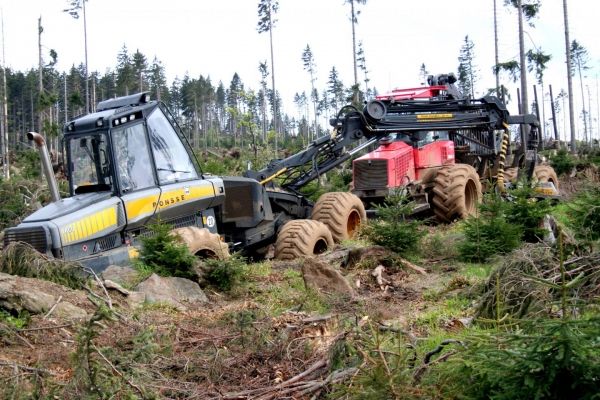Białowieża Forest in Eastern Poland is one of the last remaining primeval forests in Europe. For the time being. In 2017, the Polish government had 100,000 more trees logged than previously, despite the fact that large areas of the Natural World Heritage site are under strict protection. They did this under the pretense of preventing the bark beetle from spreading further. The motor saws are quiet now after protests from environmental activists, Europe-wide criticism in the media and concerns by the European Commission. The case has been handed to the European Court and the minister of the environment was sacked.
Białowieża Forest in Eastern Poland is one of the last remaining primeval forests in Europe. For the time being. In 2017, the Polish government had 100,000 more trees logged than previously, despite the fact that large areas of the Natural World Heritage site are under strict protection. They did this under the pretense of preventing the bark beetle from spreading further. The motor saws are quiet now after protests from environmental activists, Europe-wide criticism in the media and concerns by the European Commission. The case has been handed to the European Court and the minister of the environment was sacked.
But this case is not an exception. Professor Jörg Müller wonders why politics and the media have singled out Poland as the culprit: "Unfortunately, such salvage logging activities in protected forests are on the rise worldwide." Together with colleagues from the University of Würzburg he wrote a policy perspective recently published in the journal "Conservation Letters" which details that this practice is common also in Germany, other European countries and Asia, making it a global problem.
Earnings from selling wood matter - not pest control
For their study, the members of the Würzburg Biocenter collated 42 case studies from 26 countries and interviewed local experts about the reasons and responsibilities of salvage logging. "Contrary to what is often communicated to the public, the main motivation for logging in protected areas is economic profit – pest control comes only second," Müller explains. The forest ecologist is in charge of the Field Station "Fabrikschleichach" of the University of Würzburg. Situated in the heart of the Steigerwald forest, the station's focus is on forest ecology, natural preservation biology and applied biodiversity research.
Salvage logging makes sense in areas where wood production is the priority in order to harvest wood while it is still usable. It is, however, not necessary for the forest's biodiversity and regeneration capacity. Especially disturbances such as storms and bark beetle infestation create valuable forest habitats for many endangered species. "They are drivers of increased species variety and structural diversity," Müller says.
Read more at University of Würzburg
Image: Salvage logging in the Bavarian Forest National Park according to the national park regulations. Here, trees infested by bark beetles are extracted in a future core zone. (Credit: Photo: Reinhold Weinberger, Bavarian Forest National Park management)




